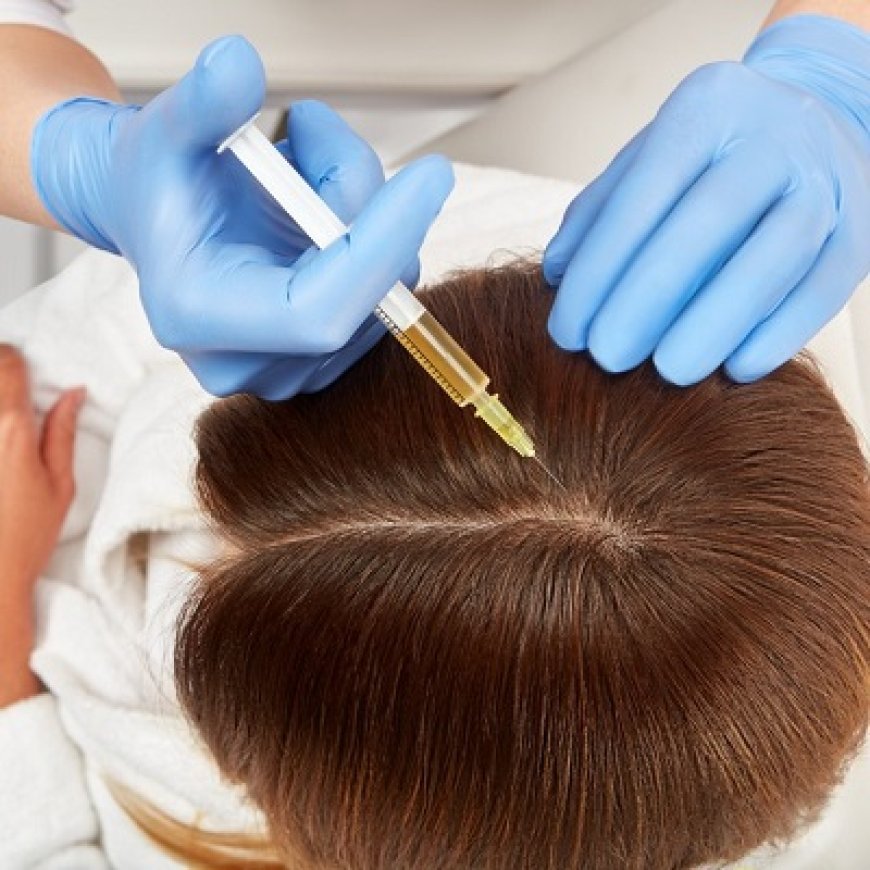Does PRP Actually Regrow Hair?
Stimulate hair growth naturally with PRP hair treatment. Safe, non-invasive therapy using your own blood to restore thinning hair and promote thicker growth.

Hair loss is a common issue that affects millions of people worldwide. From genetic predispositions to stress and health conditions, various factors can contribute to thinning hair and baldness. Platelet-Rich Plasma (PRP) therapy has emerged as a popular treatment option for those looking to combat hair loss. But does PRP actually regrow hair? In this blog, we'll explore what PRP is, how it works for hair restoration, and whether it truly delivers on the promise of hair regrowth.
What is PRP?
Platelet-Rich Plasma (PRP) in Islamabad is a concentration of platelets derived from a patient’s own blood. Platelets are rich in growth factors and play a crucial role in tissue repair and regeneration. PRP therapy involves drawing a small amount of the patient’s blood, processing it to concentrate the platelets, and then injecting the PRP directly into the scalp.
This therapy has been widely used in various medical fields, including orthopedics, dermatology, and aesthetics, for its regenerative properties. In the context of hair loss, PRP is believed to stimulate hair follicles, encouraging new growth and reducing the progression of hair thinning.
How Does PRP Work for Hair Loss?
PRP therapy is typically used to treat androgenetic alopecia, a genetic condition that leads to hair thinning and receding hairlines. The process involves several steps:
- Blood Extraction: A small amount of blood is drawn from the patient.
- Centrifugation: The blood is spun in a centrifuge to separate the platelet-rich plasma from the red blood cells and other components.
- Injection: The concentrated PRP is injected into the scalp, specifically targeting areas with thinning hair or bald patches.
The growth factors in PRP help to repair damaged hair follicles and stimulate the development of new hair shafts. It can also improve the health of existing hair by increasing blood flow to the scalp and prolonging the hair growth phase (anagen phase). This makes it a potentially effective treatment for hair thinning and shedding.
Is PRP Effective in Regrowing Hair?
The effectiveness of PRP in regrowing hair varies from person to person, but several studies and anecdotal evidence suggest that PRP therapy can indeed promote hair growth. Here's what the research and expert opinions say:
-
Scientific Studies:
Clinical studies have shown promising results for PRP in hair regrowth. In one study published in Dermatologic Surgery, PRP was found to significantly increase hair density and hair thickness in patients with androgenetic alopecia. Another study in Journal of Cosmetic Dermatology reported a 30% increase in hair growth after PRP therapy. -
Anecdotal Evidence:
Many patients who undergo PRP treatments report noticeable improvements in hair thickness and a reduction in hair shedding. However, it is important to note that PRP may not work for everyone, and individual results can vary. -
Best for Early Stages of Hair Loss:
PRP is most effective for individuals in the early stages of hair loss, where hair follicles are still active but weakened. For patients with advanced baldness or hair loss where the follicles are no longer viable, PRP may not be as effective in promoting significant regrowth. -
Consistency is Key:
Like many cosmetic treatments, PRP requires consistency. Most patients need multiple sessions to see optimal results, and maintenance treatments may be necessary to sustain hair growth. Typically, a series of three treatments spaced four to six weeks apart is recommended, with follow-up treatments every six months to a year.
PRP vs. Other Hair Loss Treatments:
When compared to other hair restoration treatments, such as medication or hair transplants, PRP has its advantages and limitations.
-
Medications (Minoxidil and Finasteride):
While medications like minoxidil and finasteride are FDA-approved and effective for hair loss, they require daily use and may come with side effects. PRP, on the other hand, uses the patient’s own blood and is considered a natural, side-effect-free option. -
Hair Transplants:
Hair transplant surgery is a more permanent solution for hair loss but is invasive, costly, and involves a longer recovery time. PRP is a non-surgical option that can complement hair transplants by improving hair density and stimulating the growth of transplanted follicles.
Are There Any Side Effects?
One of the biggest advantages of PRP therapy is its minimal side effects. Since PRP uses the patient’s own blood, the risk of allergic reactions or rejection is extremely low. Common side effects include mild swelling, redness, or discomfort at the injection sites, but these usually subside within a day or two. There is minimal downtime, and most patients can resume their regular activities immediately after the procedure.
Who is a Good Candidate for PRP?
PRP therapy is suitable for most individuals experiencing hair thinning or early-stage hair loss. It is particularly effective for those with androgenetic alopecia, a genetic form of hair loss that affects both men and women. However, it may not be the best option for individuals with severe hair loss, scarring alopecia, or inactive hair follicles.
Consulting with a dermatologist or hair restoration specialist is essential to determine whether PRP is the right treatment for you. They will assess your hair loss pattern, medical history, and overall scalp health before recommending PRP or other treatments.
Conclusion:
PRP therapy offers a promising, non-invasive solution for hair regrowth. While it may not deliver the same dramatic results as a hair transplant, PRP can significantly improve hair density, reduce hair shedding, and promote natural regrowth in individuals with early-stage hair loss. As with any treatment, the success of PRP depends on factors such as the patient’s hair loss condition, the expertise of the practitioner, and the consistency of the treatments. For those looking for a natural, low-risk way to stimulate hair growth, PRP is certainly worth considering.
For more information visit Dynamic Clinic PK
What's Your Reaction?




























